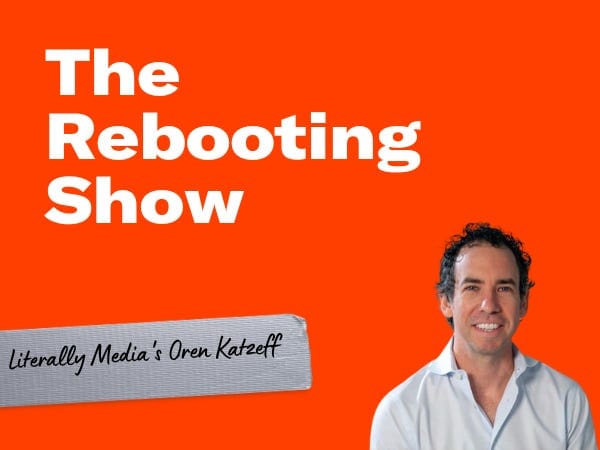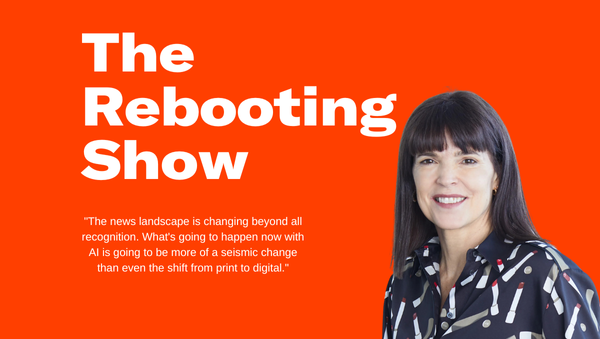Publisher-creator partnerships
Literally Media's in business with a TikTok lumberjack
One of the things I like most about newsletters is that people write back. Thanks to Ana, Jeremy and Lela for their Istria recommendations. I’m currently writing in a tiny village called Dračevac, where I’ve befriended a neighborhood dog named Nera, who enjoys going on hilly runs and eating kobasica in the sun. Nera might be onto something.
As summer begins to wind down, I can’t help but look ahead to post-Labor Day. We are embarking on our first research project, in collaboration with VideoElephant. If you’re at a publisher and thinking about your approach to video, please take this two-minute survey that will become the basis for a report we’ll release next month. Thanks. Appreciate you taking the time.

How will iOS17 impact your email strategy?

Not sure how iOS17 and Link Tracking Protection might impact your email and campaign measurement? We tested the iOS17 public beta on our email sending platform to see how iOS17 might affect link, UTM and conversion tracking — so you know what to expect once it goes live.
Find that — and email performance stats from more than 1.8 billion emails sent through Omeda’s ESP — in this quarter's Email Engagement Report.
Why Literally Media is partnered with a TikTok lumberjack

One of the most important, and I believe durable, shifts in the media business is power moving from institutional brands to individuals. That’s why the most interesting new media brands are either built around an individual or are brands that are closer to brands than the top-down approach typically taken that treats individuals as interchangeable pieces.
Most media brands will need to shift their models in order to embrace the power of individual brands – OK, we can call them “creators” if we must – that have more connectivity with people than polished brands created on a white board. The Union Square riot over a Twitch streamer’s PS5 giveaway doesn’t happen if IGN was doing it.
Often individual brands are placed in opposition to institutional brands, but both have strengths that can benefit the other. Creators lack the infrastructure and brand relationships to turn their attention and connection into businesses.
Thoren Bradley is an example of unique talents building strong followings. He’s a lumberjack with 9 million followers on TikTok. In the new battle for attention in a media environment completely mediated by algorithms, Thoren is winning. The TikTok lumberjack is working with Literally Media, the company that encompasses a clutch of internet culture and comedy assets like Know Your Meme, Cheezburger, Cracked and EBaum’s World.
Literally manages Thoren’s Snapchat channel, provides management services and content collaboration and access to brand deals. This is something more publishers are providing with creators, as the publishing companies still have the brand relationships and infrastructure that’s critical to turning attention into money.
“TikTok creators that are very good on TikTok aren't that great on YouTube or aren't that great on Snapchat,” Oren said on this week’s episode of The Rebooting Show. “We're helping them develop their channel. We're helping them take the work off their shoulders. Oren (08:50.557)
we have a team that's very good at building a day-to-day experience on those channels and monetizing it.”
The efforts to work with creators are part of Oren’s growth strategy for Literally, which he joined as CEO in March 2022 following a stint advising the company. Making money off web culture and comedy isn’t easy. College Humor and Funny or Die found that out. Oren, who I got to know when he was head of programming at Tastemade and then president at Condé Nast Entertainment, is banking on diversifying the business from a display ads business to more vibrant areas.
“From an advertising standpoint, if you want to dip your toes in comedy in any way, you must have a conversation with us because we're tapped into the influencers and creators that you want to work with. We're on all the platforms that matter, and we're creating content that we know audiences are really clamoring to see.”
One of those areas is digital video, where Literally now has over 500 million video views a month across its brands. (Yes, I know, video views again.) This is part of a new pivot to video that’s grounded in actual revenue (imagine) from series – Literally has 15 Snapchat shows – versus fleeting three-second views. For instance, through Cracked, Literally is building its “Honest Ads” show into a franchise.
“I knew the fan base was there,” said Oren, who was with Demand Media when it owned Cracked. “I knew that we could reboot video in a way that would work. I knew that there was additional IP that we could create and drive massive audiences to.”
That will help diversify Literally’s business, which was about 80% display advertising revenue when Oren joined. Video is one path — Oren says it’s over $1 million as a business now — but as I wrote the other week, publishers are looking to in-person gatherings to escape the rough economics of digital advertising. (Comedy and internet culture are not going to be subscription businesses.) Fortunately for Literally, comedy shows are a natural fit. Last week, Cracked debuted its first comedy show in Brooklyn. Oren expects Cracked Live to become a franchise, and feed into the company’s digital video business.
“It really ties in nicely to what we're trying to do with creators in general, which is to help them build their careers, monetize their content, and in doing so also help build our own brands.”
Check out the full episode for more, including Literally’s efforts to create an meme insights tool for brands, although Oren’s not calling the “Bloomberg Terminal of memes.”

Looking to win the rest of 2023?
The first half of the year delivered another revenue punch to the gut — along with challenges like budget cuts, widespread layoffs, and uncertainty from the explosion of AI. Are brighter times ahead? Sovrn's first-half 2023 data insights report delivers the digital advertising performance, analysis, and trends you need to optimize the rest of the year. Plus, you’ll find actionable tips and guidance to position yourself to win these next two quarters — and beyond.
Coming this fall: AI battles
On the forthcoming episode of People vs Algorithms, Alex mentioned on this summer has mostly been a lull in what once seemed to be cascading advances in AI tools. But technology marches on, and in the fall we’ll likely see more developments that both point to the tremendous power of AI to replace rote tasks and rising anxiety about what it means to labor.
AI is going to be used far and wide to do more with less, and that less will inevitably be human labor. The idea that it’s just about making workers more efficient is somewhat risible. The Hollywood strikes are a sign of labor strife to come, without a doubt. sums it up well:
The battle over artificial intelligence - both inside and outside of Hollywood - is between those who do the work and those who profit from it. A study by IBM revealed that 43% of CEOs have reduced their workforce due to generative AI. While 75% of CEOs believe they have the knowledge and skills to integrate generative AI, only 30% of their teammates agree. Executives are gung-ho about the prospect of automating every appreciable part of a business, adopting AI - which hallucinates regularly and is somehow getting worse - as fast as possible, regardless of whether it actually makes sense.
And that’s what makes the Hollywood strike a sign of things to come. Labor-capital relations are already at a low. There’s a lack of trust that exists beyond Hollywood between those doing the work and those calling the shots. From Lucas Shaw at Bloomberg:
AI is a great way to cut costs. Profits at the largest entertainment companies slipped more than 90% in roughly the past decade, thanks to the collapse of cable TV and the decline of movie theater attendance. Streaming, which was supposed to bring the business into the future, has been a money pit for everyone but Netflix.
From the view of the corner office, this is simply reality. Streaming has proven to be a terrible business. Not using AI to cut costs in 2023 would be like skipping the internet in 1995. Just look at the Paramount results to see how rough the business has been for incumbents.
Thanks for reading, and I hope you are enjoying a break before September. Send me your feedback by hitting reply.
Sign up for The Rebooting Dinner Series, which we are kicking off in September. We are having the dinners around themes – revenue diversification, video, subscriptions – and will be prioritizing invitations to people with operational responsibilities in those areas. If you want to discuss sponsorship opportunities, please send me a note.




